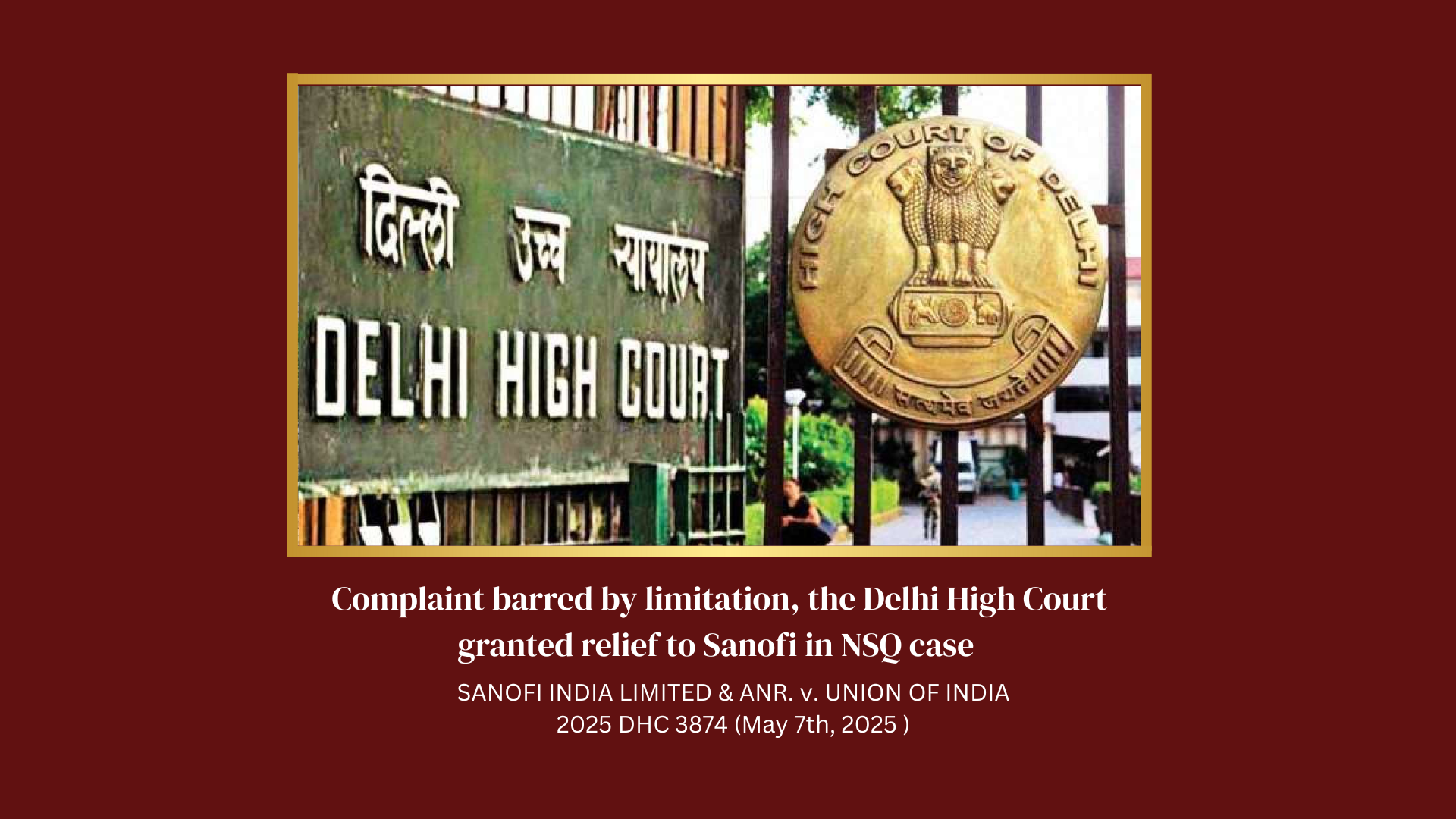
Complaint barred by limitation, the Delhi High Court granted relief to Sanofi in NSQ case
SANOFI INDIA LIMITED & ANR. v. UNION OF INDIA
2025 DHC 3874
May 7th, 2025
In this case, the Petitioner namely, Sanofi India Limited is the manufacturer of Drugs duly licensed by State Drugs Controller, Licensing Authority cum Controlling Authority, Gujarat. In June, 2015 Petitioner No.1 manufactured the Drug „Combiflam' (Ibuprofen and Paracetamol Tablets) vide Batch No.A150683. On 04.05.2016, a sample of the Drug from the aforesaid Batch Number was taken by the Drugs Inspector and sent for analysis and The Report dated 09.06.2016 of the Government Analyst was received with the statement that the Drug was “Not of Standard Quality”.
Pertinently, the Government Analyst had tested the pharmaceutical Drug sample as per the old method analysis, prevalent at that time in the Indian Pharmacopeia i.e. IP-2014, which got subsequently changed in the year 2018.
Further, Show Cause Notice dated 17.06.2016 under Sections 18A and 18B of the Drugs and Cosmetics Act , 1940 (hereinafter " the Act ") was sent to Chief Medical Officer, CGHS, New Delhi and Vedant Medicare Agencies thereafter, Show Cause Notice dated 06.08.2016 was sent to the Petitioner. In response, the Petitioner asserted that the old Manufacturing and Packaging processes were executed as per the instructions. There was no deviation observed in the Manufacturing and Packaging. The Analytical Test Report for the Batch found it to be of standard quality with respect to all the test parameters including Disintegration Test at the time of release.
Moreover, another Show Cause Notice dated 27.09.2016 was again issued by Drug Inspector, CDSCO under Section 18A and 18B of the Act to Petitioner No.1 directing him to stop usage/ distribution of the subject Drug. A similar Reply as given to FDCA, was given to the Show Cause Notice by Petitioner No.1 on 05.10.2016 informing the Drug Inspector that the sale has been stopped and the entire Batch has been recalled.
It also specifically mentioned that there was no deviation observed during manufacturing and packaging of the Batch. The probable root cause of failure is the Disintegration test result from improper storage conditions at market and formulation aspects. Petitioner No.1 assured that it would implement corrective and preventive measures to avoid such issues in the future.
Accordingly Complaint under Section 18(a)(i) read with Section 16 punishable under Section 27(d) of the Act was accordingly filed on 20.05.2019 before the Trial Court and Summon Orders dated 22.07.2019, 10.02.2021 and 05.10.2021 were issued by the court.
Aggrieved by the above-mentioned Complaint and the Summon Orders, the Petitioner approached the High Court of Delhi for quashing of such orders and complaint via a writ petition under Article 226 of the Constitution of India
The petitioners contended the filing of the Complaint after the expiry of the drug in question vitiated the entire proceedings insomuch as the valuable right of the Petitioners to seek re- testing of the sample in terms of Section 25 of the Act got defeated. Further the request of the Petitioners sent vide Reply dated 05.10.2016 to include Apparatus B while conducting the Disintegration Test has been eventually accepted and has been included in Indian Pharmacopeia in 2018 and Complaint has been filed in 2019.
The Petitioner also contended the Complaint should have been instituted in Ghaziabad while the entire proceeding has been conducted in Delhi, which is beyond the territorial jurisdiction.
Decision
After hearing both the parties the High Court of Delhi, rejected the argument of the Petitioner and stated that the samples have been taken by the Drug Inspector for the North Zone, which may have been defined as Ghaziabad, but there is nothing to show that the North zone did not include Delhi or that she had no jurisdiction to collect the samples from Delhi. Admittedly, the samples have been collected from CGHS, Laxmi Nagar, New Delhi and the Complaint has also been filed in Delhi. Therefore, the jurisdiction of Delhi Court has been rightly invoked.
More importantly the High Court held that the Complaint is barred by Limitation the relevant para is quoted below:
Para 46: “In the present case, as has been noted earlier, the samples were taken on 04.05.2016, while the Complaint has been filed on 20.05.2019. This bar of limitation could have been extended under Section 473 Cr.P.C. provided an Application was filed to this effect. Evidently, no such Application has been filed and, therefore, no cognizance could have been taken, it being barred by Limitation.”
Accordingly, the Delhi High Court allowed the Writ Petition and the petitioners were discharged as the Complaint was filed beyond the period of limitation and therefore it was quashed.
Click here to access the full Judgment
Note:
Cases related to Pharmaceuticals are highly technical and knowledge-driven. If you're searching for a drugs and cosmetics lawyer in India, a pharmaceutical lawyer, Mace Corporate Associates is the perfect place. If you are searching for a DPCO Lawyer for overcharging cases or DPCO Compliance, Mace can assist you well.
May it be a clinical trial Lawyer or a Medical device lawyer, Mace can be of great and perfect match for Pharmaceutical litigation. Mace has an accomplished track record for Not of Standard Quality Cases, Licensing Cases etc.

